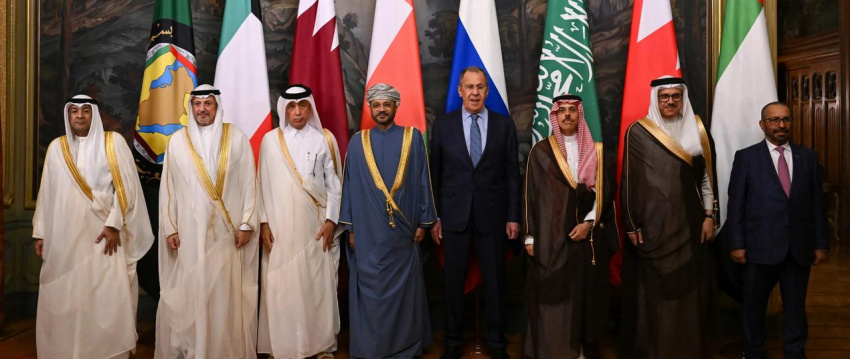Iran's Sovereignty Dispute: Unraveling the Implications of the Joint Statement of Russia and GCC

The 6th joint meeting of the foreign ministers of the Persian Gulf Cooperation Council and the Russian Federation in Moscow has ignited a diplomatic controversy surrounding Iran's sovereignty claims over the three islands of Greater and Lesser Tunbs, and Abumusa. The issuance of a final statement during the meeting, expressing support for the United Arab Emirates' (UAE) initiative to resolve the issue through bilateral negotiations or the International Court of Justice, questioned Iran's territorial integrity. This development has caused significant reactions both within and beyond Iran's borders.
To gain insight into the matter and assess its implications, we interviewed Heshmatollah Falahatpisheh, a prominent expert in foreign policy and a former head of the National Security and Foreign Policy Commission of the 10th Parliament.
Mr. Falahatpisheh, since the issuance of the joint statement between the Persian Gulf Arab countries and Russia, we have witnessed different analyses and evaluations. What are your thoughts on this statement and the repeated claims about the islands?
I believe that this joint statement and the claims being raised are of much greater importance and difference than previous statements addressing similar issues.
Could you elaborate on why you think so?
The current situation indicates that the Persian Gulf countries, especially the United Arab Emirates, are attempting to exploit the influence of two Security Council member nations with veto power, namely China and Russia, to support their stance on the islands, particularly Abu Musa Island, through a consultative vote in the Security Council.
What do you mean by a "consultative vote" in the Security Council?
I strongly believe that a conspiracy is underway against Iran's interests, national security, and territorial integrity. Over the last few months, the UAE has intensified its baseless claims, indicating the seriousness of this matter. It surpasses the mere statements of the Persian Gulf Cooperation Council or the Arab League. Notably, during Chinese President Xi Jinping's visit to Riyadh, a joint statement was signed with the Gulf Cooperation Council, making similar claims about Iranian islands. Meanwhile, Russian Foreign Ministers met with the Persian Gulf Cooperation Council in Moscow while Iranian officials were busy with Iran-Russia Cultural Week. This suggests a lack of strategic planning from Iran's side. Just like the previous joint statement with China, Russia has now also lent its signature to this document. This is crucial because it involves two Security Council members, China and Russia, endorsing the UAE's position on the islands.
What does this mean for Iran's future?
The outcome of this situation will depend on Iran's actions and the UAE's efforts in the coming years. The UAE appears to be planning for the long term, envisioning a diplomatic strategy to influence the Security Council through China and Russia's support. Iran faces challenges and growing tension with much of the international community, especially Western nations, which has led to disputes and isolation. As a result, Abu Dhabi is keen to bring Beijing and Moscow together to intervene in this matter. Furthermore, Iran's apparent unconditional and dependent relationship with Russia and China has contributed to Tehran's reluctance in defending national interests, particularly when it comes to these two nations' positions. Consequently, the UAE seeks to exploit China and Russia's influence to bypass Iran's interests.
You seem to suggest that the UAE's efforts aim to create a diplomatic context with historical Chinese involvement. Could you elaborate on this?
Indeed, the UAE is working on a diplomatic literary context that centers around involving China and Russia in the issue. This is primarily because Iran's relations with Western Security Council members, such as the United States, France, and the United Kingdom, continue to deteriorate. By leveraging China and Russia's veto power, the UAE is attempting to gain support for its claims against Iran, even without Iran's consent.
How ready is the international community to entertain this issue raised by the UAE?
The international community's readiness to consider the UAE's claims remains uncertain. The UAE seeks to exploit the first paragraph of Article 96 of the United Nations Charter, which allows the UN Security Council or the General Assembly to request an advisory vote from the International Court of Justice in The Hague. The UAE's ultimate goal is to create a political, diplomatic, and legal shortcut to obtain a consultative vote in favor of their claims. However, this is contingent on both sides being amenable to the court's involvement, and Iran has consistently opposed such external intervention, viewing the matter as an internal issue.
Considering the delicate nature of the situation, what is your assessment of Iran's foreign policy in this regard?
Iran's foreign policy faces two chronic challenges. Firstly, it tends to oscillate between extremes, leading to inconsistencies in diplomatic approaches. Secondly, Iran has perceived strategic relations with China and Russia, while these nations' actions are primarily driven by national interests. This has resulted in Iran's interests being overlooked on various occasions.
In light of the heightened media and public sensitivity, is there a likelihood of the issue being brought to international forums?
Contrary to popular belief, the issue at hand is not Iran's problem, but rather the UAE's efforts to orchestrate a diplomatic offensive against Iran. The dispute is not solely about the three islands but revolves around Abu Musa Island. The UAE should engage in bilateral dialogue with Iran to resolve internal issues. However, due to Iran's steadfast refusal to compromise its territorial integrity, the UAE seeks to exploit the Security Council's capacity. This may lead to collusion in favor of the UAE, even in Iran's absence and opposition. We've seen similar scenarios in the past, where resolutions against Iran were adopted despite Iranian opposition, with China and Russia voting in favor. As major commercial and economic interests exist between the Arab Gulf countries and China and Russia, these two permanent Security Council members are unlikely to ignore the UAE's claims.

